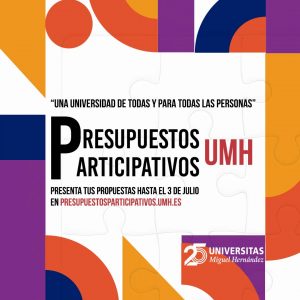Participatory Budgeting for the University Community
The Miguel Hernández University of Elche (UMH) has announced the first call for Participatory Budgeting, as part of a framework for promoting participation, transparency, and university social responsibility. This initiative is the brainchild of the UMH Vice Rectorate for Inclusion, Sustainability and Athletics along with the University Management, and presentations for proposals may be given June 11 – July 3, 2022.
This university has endowed 50,000 euros from its 2022 budget so that the university community can prepare proposals and thereby participate directly in the allocation of resources, following a direct voting process. The monetary amount linked to Participatory Budgeting will be used to carry out local projects on the four university campuses and that are aligned with the challenges identified in the new UMH Strategic Plan. Such projects will enhance transparency in university management, improve communication channels between university administrators and the university community, disclose budgetary planning and seek collaboration in management, facilitate direct participation in voting, plus promote active reflection and solidarity to improve university life.
The 2022 UMH Participatory Budgeting consists of 4 stages, and these are detailed on its website at presupuestosparticipativos.umh.es. The first stage continues through June 10, which is for informing the university community about this initiative. Stage 2 is for presenting project proposals, and this portion runs June 11 – July 3. The Monitoring Commission will then assess all the proposals given during stage 3, July 4 – 22. Finally, in stage 4, the university community may cast votes on their favorite proposals, and they have September 5 – 22 to express their opinions on them. For the final stage, each UMH community member may vote for a maximum of 3 proposals, and award each 5, 3, and 1 points, respectively.
Proposals may be presented by any member of the university community; members include faculty, research personnel, administrative and services personnel, plus the student body. The requirements that proposals must meet include the following: be specific, be simple to execute, create opportunities to improve UMH campuses, and enhance university community activities on the campuses. Likewise, they must benefit large numbers of the university community; be inclusive for all groups; be sustainable in social, environmental, economic, and territorial aspects; have long-term viability; and promote and strengthen one or more of the 17 Sustainable Development Goals; and finally, they require a budget of 3,000 – 15,000 euros. They must also be technically feasible in their execution, and be able to be executed in a period not exceeding 6 months.
Participatory Budgeting strives to show the UMH community different challenges highlighted during the diagnostic process that preceded the new Strategic and Social Commitment Plan, which the university will present in upcoming weeks. Standing out, among others, are the Management Challenges: Ethics and Quality (i.e., actions to strengthen sustainability, transparency, and the valorization of management); Economic and Infrastructure Management (actions to improve the effectiveness of resources, energy efficiency, decarbonization, as well as improving parking and leisure areas); Human Resource Management (actions that catalyze internationalization); and Teaching (actions that promote education and the recognition of soft skills and participation by the student body in satisfaction surveys on their education). Also standing out are the challenges of University Life and Employability (actions to promote comprehensive health, invigorate university life, and promote employability and entrepreneurship among students); Research and Transfer (actions that strengthen the transfer of research results to society and for measuring the impact from research on social, economic, and environmental aspects); and finally, Relationships with Groups of Interest and Contributions to Society (actions to enhance and strengthen activities of university development cooperation and that bring relationships of this university with society closer together).
With this initiative, the UMH is contributing to the Sustainable Development Goals, and especially SDG 16, Peace, Justice and Strong Institutions; in addition to SDG 17, Partnerships for the Goals.
For further information, go to presupuestosparticipativos.umh.es
